| Srl | Item |
| 1 |
ID:
131446
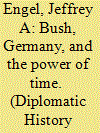

|
|
|
|
|
| Publication |
2013.
|
| Summary/Abstract |
George H.W. Bush backed German reunification with a puzzling degree of enthusiasm. His strategic reasoning was clear and not in dispute, as he desired to keep a unified Germany enmeshed within NATO. Less obvious, however, is his general forgiveness of Germany's past, for which he was pilloried. Yet history was much on Bush's mind in reaching these decisions. Germans had learned from the past, he argued. Europeans had not. They could not keep the peace no matter their ongoing political consolidation, his administration concluded by reading European history, without Americans in their midst. Bush backed unification, therefore, to ensure NATO's survival and thus an ongoing American presence on the continent. By studying Bush's sense of history, and a policymaker's historical sensibility more broadly, historians can thus gain greater insight into this decision and how strategic decisions are more generally formed
|
|
|
|
|
|
|
|
|
|
|
|
|
|
|
|
| 2 |
ID:
129795
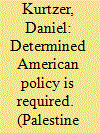

|
|
|
|
|
| Publication |
2014.
|
| Summary/Abstract |
U.S. Secretary of State John Kerry has done an admirable job of creating an "architecture of peace" to support the negotiations launched in July 2013. He engineered the appointment of retired U.S. General John Allen to delve deeply into Israel's security requirements following a peace treaty, recognizing that the security dilemmas would range far beyond the immediate challenges of securing an Israeli-Palestinian border. Kerry understood that Israel's readiness to take the risks associated with withdrawal from the Occupied Palestinian Territories (OPT) would be influenced directly by the degree to which Israel's security requirements were taken into account.
|
|
|
|
|
|
|
|
|
|
|
|
|
|
|
|
| 3 |
ID:
124395
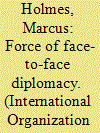

|
|
|
|
|
| Publication |
2013.
|
| Summary/Abstract |
Face-to-face diplomacy has long been the lynchpin of international politics, yet it has largely been dismissed as irrelevant in theories of cooperation and conflict-as "cheap talk" because leaders have incentives to dissemble. However, diplomats and leaders have argued for years that there is often no substitute for personally meeting a counterpart to hash out an agreement. This article argues that face-to-face diplomacy provides a signaling mechanism that increases the likelihood of cooperation. Face-to-face meetings allow individuals to transmit information and empathize with each other, thereby reducing uncertainty, even when they have strong incentives to distrust the other. The human brain has discrete architecture and processes devoted to parsing others' intentions via cues in face-to-face interaction. These processes enable actors to directly access the intentions of others with a higher degree of certainty than economic and game-theoretic models of bargaining predict.
|
|
|
|
|
|
|
|
|
|
|
|
|
|
|
|
| 4 |
ID:
131597
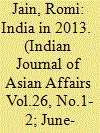

|
|
|
|
|
| Publication |
2013.
|
| Summary/Abstract |
The year 2013 witnessed momentous developments in the outside world which impinged on India's national interest in several ways. The UPA, leading the central government, is struggling hard to review the national
priorities at the fag end of its second term. Addressing the fifth annual conclave of Indian mission heads in New Delhi in November 2013, Prime Minister Manmohan Singh stated that the UPA government had sought to bring about a "fundamental reset" in lndia's foreign policy based on lndia's national priorities and its role and destiny in world affairs. He stipulated the following five de?ning principles of the country's foreign
policy.
|
|
|
|
|
|
|
|
|
|
|
|
|
|
|
|
| 5 |
ID:
127064
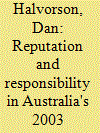

|
|
|
|
|
| Publication |
2013.
|
| Summary/Abstract |
This article reinterprets Australia's motives for its 2003 intervention in the Solomon Islands. The central argument is that considerations of Australia's international reputation have not been afforded sufficient importance in explaining the Howard government's decision to intervene. A primary concern for the Howard government was to bolster Australia's reputation in the 'War on Terror' vis-à-vis the USA and the international community more broadly by being seen to maintain order in its regional sphere of responsibility. The article establishes the historical basis for Canberra's claims to a special responsibility for the South-West Pacific region. It then demonstrates the close connection between Australia's responsibility for order in its region and the reputational norms that evolved during the early years of the War on Terror. These claims are substantiated through an analysis of the Solomon Islands crisis from June 2000 until the Regional Assistance Mission to Solomon Islands was deployed in July 2003.
|
|
|
|
|
|
|
|
|
|
|
|
|
|
|
|
| 6 |
ID:
132257
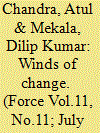

|
|
|
|
|
| Publication |
2014.
|
| Summary/Abstract |
Ensuring that delayed crucial aviation projects are delivered fast should be the new government's priority
Hope is riding high on the new Narendra Modi government. Little over a month after assuming the high office, India's Prime Minister has managed to boost the confidence of the Indian military forces. While symbolic gestures like spending a day aboard INS Vikramaditya helped to bring in motivation to the Indian Navy, which was plagued by series of accidents in the last few months; it is his policy decisions like opening up the defence industry to the private sector that has attracted foreign investors' confidence.
|
|
|
|
|
|
|
|
|
|
|
|
|
|
|
|